Key takeaways:
- Ethics committees serve as platforms for diverse discussions, navigating complex ethical dilemmas while fostering a culture of respect and collaboration.
- They play a critical role in developing ethical guidelines, mediating between patient autonomy and clinical recommendations.
- Active listening and vulnerability are essential for enriching discussions and fostering deeper understanding among committee members.
- Continuous education and structured facilitation are vital to ensure effective participation and mitigate challenges within ethics committees.
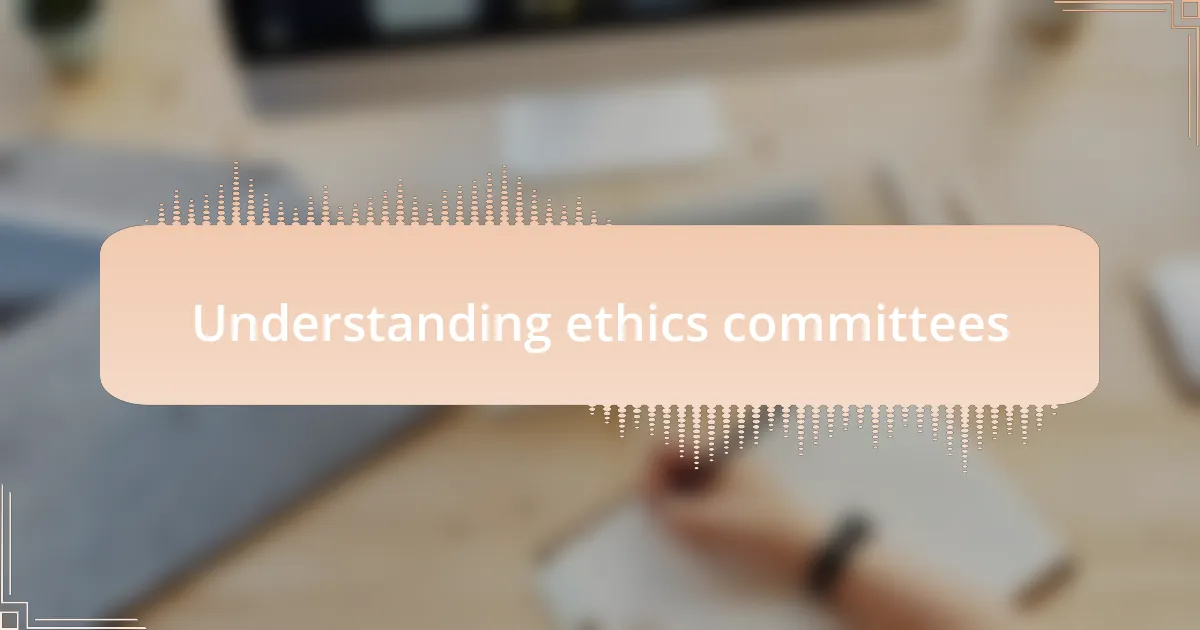
Understanding ethics committees
Ethics committees are often framed as the guardians of moral integrity within healthcare settings. I remember my first encounter with one; it felt both intimidating and enlightening. The diverse backgrounds of committee members brought a range of perspectives to the table, and I couldn’t help but wonder: how could such diverse opinions coalesce into a single ethical standard?
Each meeting presented an opportunity to wrestle with challenging ethical dilemmas. I often felt a mix of anxiety and anticipation as we navigated complex cases that pushed my understanding of ethics. Have you ever contemplated how a simple decision can ripple through the lives of patients and families? Those discussions helped me appreciate the profound impact of our decisions.
Engaging in these dialogues fostered a sense of community and collaboration. I recall a particularly heated discussion where emotions ran high, yet the committee’s commitment to shared values steered us back to constructive debate. It taught me that ethics committees are not just about making hard calls; they’re about fostering a culture of respect and deep reflection.
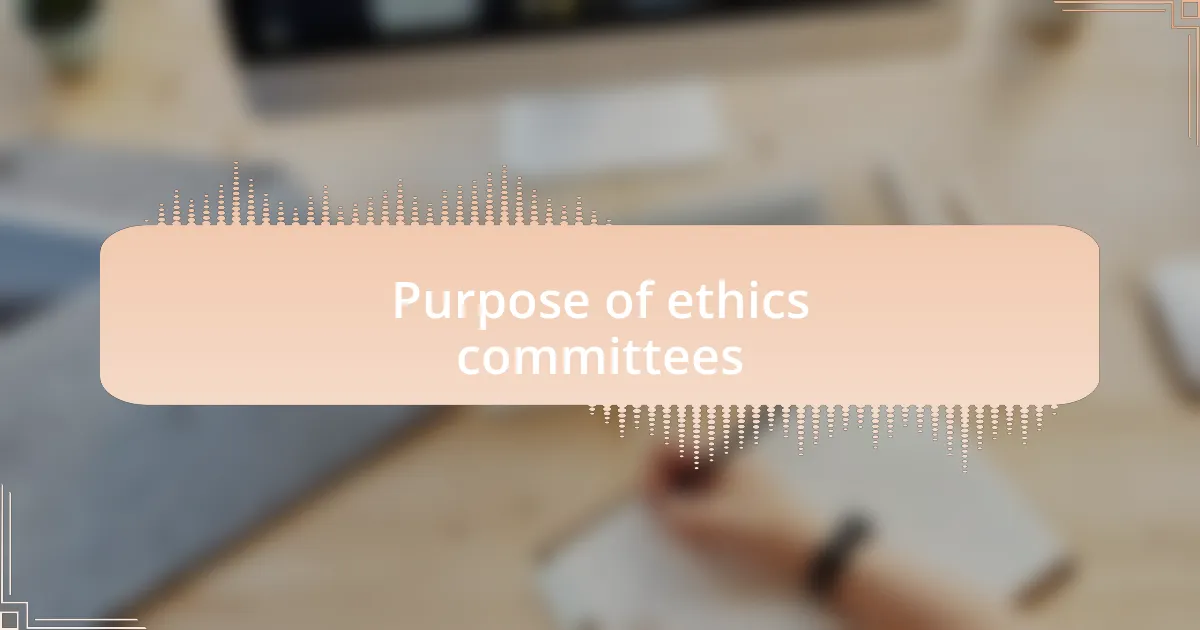
Purpose of ethics committees
Ethics committees serve a critical function in healthcare by providing a structured forum to deliberate ethical issues that arise in patient care. I remember a poignant case where we discussed the balance between patient autonomy and medical advice. How do we honor a patient’s wishes when they contradict clinical recommendations? This dilemma highlighted the need for ethics committees to help mediate such tensions, ensuring decisions are made thoughtfully and reflectively.
These committees also contribute to the development of ethical guidelines and policies within healthcare institutions. I once participated in drafting a policy regarding end-of-life care, and it was eye-opening to witness how collaborative discussions shaped thoughtful, compassionate guidelines. Isn’t it reassuring to realize that our collective efforts can influence institutional practices, ensuring that our healthcare system operates with integrity?
Furthermore, ethics committees play an educational role, offering insights and training for healthcare professionals about ethical principles. I often find myself reflecting on a workshop we held, where we delved into case studies that showcased real-life dilemmas. Have you ever thought about how ongoing education can empower staff to make ethical decisions more confidently? It reinforced for me that the purpose of ethics committees extends beyond decision-making; they help cultivate a culture of ethical awareness and sensitivity in clinical practice.
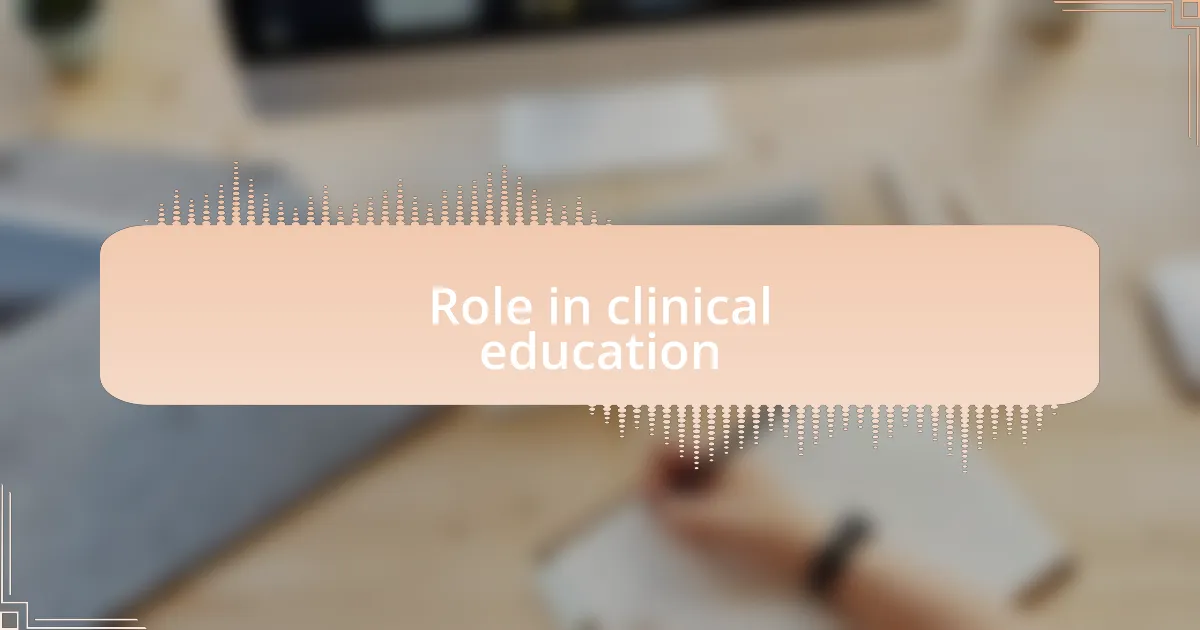
Role in clinical education
Ethics committees play an indispensable role in clinical education by facilitating essential discussions around ethical dilemmas that healthcare professionals encounter daily. I recall a particularly impactful training session where we reviewed a case involving informed consent. The diverse perspectives shared highlighted how ethics committees not only provide guidance but also enrich our understanding of complex ethical issues. It made me realize how vital it is for us to be equipped with the ethical frameworks that can guide our decisions in challenging moments.
In my experience, these committees often serve as a bridge, fostering collaboration among various healthcare disciplines, which is crucial for effective clinical education. Once, while working on a case that involved a disagreement between specialists, the committee’s input was transformative. It reminded me of the importance of interdisciplinary approaches and how learning from one another’s ethical viewpoints can lead to better patient outcomes. Isn’t it fascinating how collaborative learning can elevate our practice?
Moreover, ethics committees empower healthcare professionals to engage in self-reflection and critical thinking. During one workshop, we were encouraged to analyze our own biases and assumptions, which truly opened my eyes to the intricacies of ethical reasoning. Have you ever struggled with an ethical fatigue that clouds your judgment? This kind of introspective training underscores how ethics committees nurture a more empathetic and thoughtful healthcare environment, fostering not just compliance but a committed ethical identity among professionals.
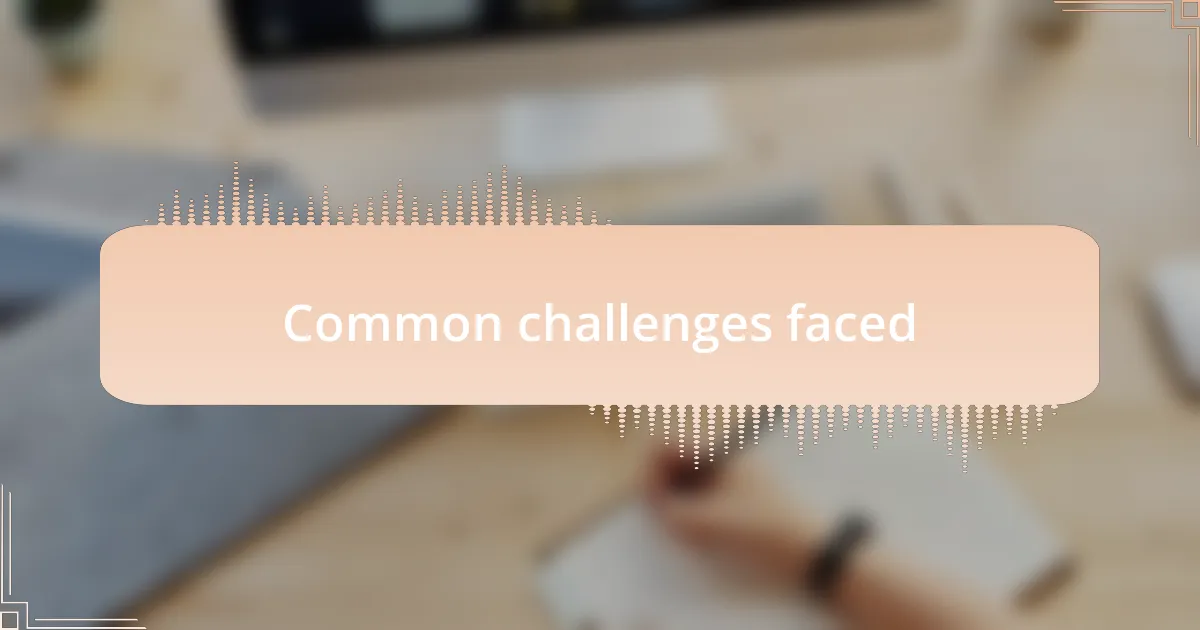
Common challenges faced
Navigating the intricacies of ethics committees often brings its own set of challenges. One notable issue I encountered was the tendency for some members to dominate discussions, which could stifle diverse viewpoints. I vividly remember a meeting where a quieter colleague had a brilliant perspective that went unheard simply because someone more vocal took charge. How do we ensure that every voice matters? This experience taught me the importance of structured facilitation in allowing everyone’s thoughts to shine.
Another common hurdle is the varied levels of understanding about ethical principles among committee members. Having been part of committees where some members were seasoned professionals while others were relatively new to the field, I noticed a gap in knowledge that created tension. For instance, during a debate on patient autonomy, the lack of consensus on key concepts made it difficult to reach a resolution. It’s crucial that committees prioritize education and alignment, fostering an environment where everyone can contribute fully and confidently.
Coping with time constraints is yet another challenge that I have faced. Meeting deadlines for case reviews or recommendations under pressure can feel overwhelming. I recall a time when our committee was racing against the clock to finalize a decision for an urgent case. It was stressful, heightening our anxiety and potentially compromising the quality of our ethical deliberations. How do we balance urgency with thoroughness? This experience reinforced my belief that having clear timelines and support from institutional leadership can significantly ease this pressure, allowing for more thoughtful discussions.
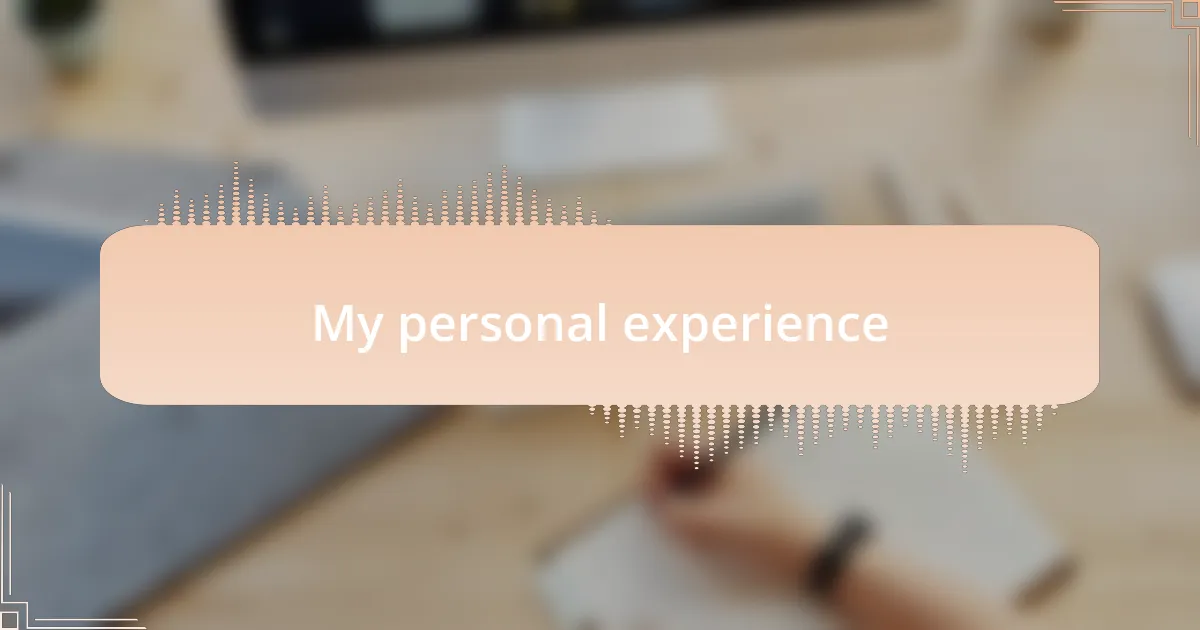
My personal experience
In my journey with ethics committees, I’ve had moments that profoundly shaped my perspective. I recall sitting through a particularly intense session where a complex case sparked passionate debate. At one point, I felt overwhelmed by the emotional weight of the discussions; the stakes were high, and I grappled with how our decisions could impact real lives. This made me realize how critical it is for committee members to not only engage intellectually but also connect emotionally with the ethical dilemmas we face.
I’ve also found the dynamics within these committees to be thought-provoking. During one meeting, I was challenged by a colleague who questioned my stance on a controversial protocol. Initially, I felt defensive, but then I recognized this as an opportunity for growth. It dawned on me that each challenge could be a chance for greater insight, prompting me to rethink my positions and articulate my reasoning more clearly. Isn’t it fascinating how friction can lead to deeper understanding?
One particular experience left an indelible mark on me. We were deliberating over informed consent in a particularly sensitive patient case, and I felt a profound sense of responsibility. I remember feeling the weight of everyone’s eyes on me as I presented my thoughts. The anxiety was palpable, but it also fueled my determination to advocate for the patient’s rights. That moment reinforced my belief that ethics committees can be a powerful platform for voicing the values that guide our work, as long as we foster a culture of collaboration and respect.
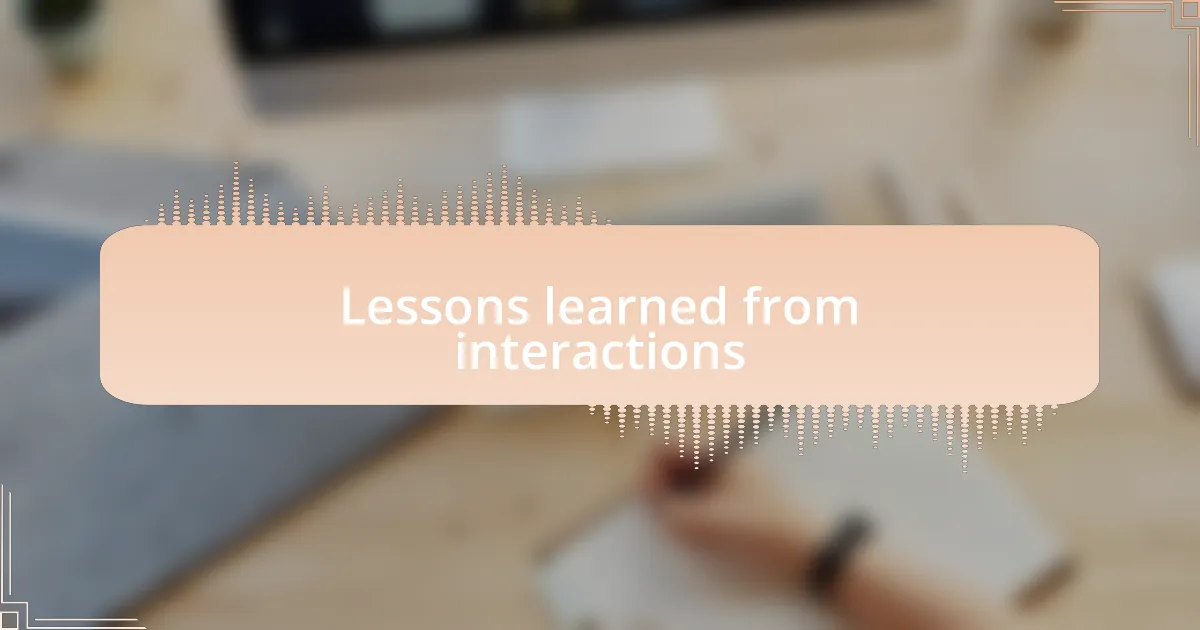
Lessons learned from interactions
Throughout my interactions with ethics committees, I’ve come to appreciate the importance of active listening. In one meeting, I found myself sitting quietly, absorbing the myriad perspectives on a particularly delicate issue. I remember thinking that if I had jumped in too quickly, I would have missed critical nuances in my colleagues’ arguments. This experience taught me that pausing to truly hear others can lead to much richer discussions and decision-making.
Another lesson I gleaned was the value of vulnerability in sharing personal perspectives. During a deliberation on end-of-life care, I opened up about my fears and experiences with loss. It was a moment of honesty that shifted the atmosphere in the room; my colleagues responded with their own stories, creating a collective understanding of the emotional weight we carried. I couldn’t help but wonder—how often do we shy away from vulnerability in professional settings, missing out on connections that enrich our dialogue?
Lastly, I’ve learned the significance of maintaining clarity in communication. I recall a situation where muddled terminology led to confusion about our ethical stance. When I took the initiative to clarify definitions and concepts, the energy in the room changed. It highlighted for me how precision in language not only streamlines discussions but also ensures that everyone feels included and understood. Isn’t it remarkable how a few careful words can bridge gaps in understanding?